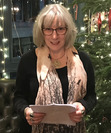Paula R.C. Readman's Blog, page 56
January 7, 2021
Audiobooks…. how much!
Okay, so people don’t like talking money, but when someone offers to do you a service, they must have some idea of costs involved. Especially if they have spent out to have their books made into audiobooks, or they run a company that records audiobooks.
All I wanted to know is what sort of prices are they talking about?
For the second time in a week someone has said to me about audiobooks. And for the second time ( to two different people) I have asked the same questions, how much are you talking about to turn a novel into an audiobook?
All I wanted to know is the sort of costs are involved so I have a idea on whether I could afford to do it, or not. It’s tough selling and marketing your novel without the expense of trying to sell and market an expensive audiobook, especially if it is of poor quality.
There must be the basis cost-
Or a mid-range to luxury audiobooks read by someone famous etc.
Are we talking about a few hundred pounds or a few thousand pounds?
Book Launch Chat: Paul Flewitt
Welcome to Clubhouse Chat page. Those of you who are not a member won’t be aware that the location of the Clubhouse is shrouded in mystery. The only way to visit it is via membership or an invite to the tearoom. Every few days, I’ll be sharing a conversation with all sorts of writers and authors at different levels of their writing careers. Over tea and cakes, or maybe a glass of something stronger, I shall be chatting with my guest about their work in progress, or latest book release.

Today, we’re here to celebrate the launch of Defeating the Black Worm, by horror writer, Paul Flewitt The horror book is part of the Short Sharp Shock collection published Demain Publishing. Welcome to the tearoom, Paul.
Thank you for the welcome and invite, Paula.
Let me start by asking you did you try to be more original when writing this book, or deliver what you felt the readers wanted?
For me, every book and story is different. In fact, Black Worm wasn’t written with publishing in mind at all. I started writing it to understand a difficult situation that I was going through a while ago. I began having issues with anxiety and panic around the time my father was diagnosed with cancer. It really hit me hard, so I started writing a story to understand the anxiety as I’d never had issues with mental health before. It built up and actually became a very good story in its own right. I re-read it after about a year and felt it was more than good enough to release, so I turned it into a proper story. Its still very raw, and it’s also a bloody bleak read. It is enjoyable though, and definitely works with the rest of my output. Did I worry that it might be a little too personal? Yes, but I felt that it was a risk worth taking. It definitely isn’t a self-help book. It isn’t a triumphant book which details how I overcame my issues, because that battle is still being fought. Is a dispatch from the abyss that I found myself in at that time, turned I to a horror story. I hope people enjoy it.
Did you feel energised or exhausted after writing this book?
I always feel tired after finishing a project. It always takes me a bit of time to recharge afterwards. This one was no different. I always put a lot of effort in, and that means it’s often exhausting.
Do you want each of your books to stand alone, or are you building a body of work that are interconnected?
Whether that be a theme, a set of characters, a setting, etc. Explain more for our readers.
I have stories which stand alone, and I have ones that will tie in. I’m currently writing a trilogy, and I’m writing a sequel to my debut novel. I don’t feel the need to tie everything I write together though. Some stories are just their own thing.
 Paul Flewitt
Paul Flewitt
How do you balance your demands on the reader with taking care of your readers? In the book did you spell everything out so your reader just had to read it, or did you rely on their emotional response to your words?
I credit readers with intelligence. I don’t spell out every little thing, and I hope the reader catches nuance. As a reader myself, I hate being talked down to or having my intelligence questioned in a book. I write to that ethic and allow the reader to work it out for themselves. I’m also a big believer that a book is just as much what the reader makes of it as it is what the writer intends, so I’m not going to beat them over the head with my intention. Let then interpret things in their way, and then it belongs to them.
Do you hope your book will deliver you literary success and how will this look to you?
All I ever ask is that those who read my stuff enjoy it. I don’t chase fads and fashions. I just write stories that I want to read and hope enough people agree. For me, success is telling a good story. If anything follows that, then it’s a nice bonus.
Was there anything you edited out of this book, you wanted to keep in, but you knew it would be a better book by cutting it?
No. I think everything that was in the first draft ended up in the final cut.
How long did you spend researching this book’s subject matter, or was it a book you had already planned?
Obviously, given that I was going through anxiety at the time, I was researching that anyway. A bit of that ended up in the story. Aside from that, I don’t really research. Even with the dark stuff like demonology and magic, I only use truth in very broad strokes. I don’t feel the need to be hyper-realistic, only believable.
What was the hardest scene to write in the book?
I don’t think there was one with Black Worm. Everything flowed really nicely and came out in a bit of a flood. The hardest decision I had to make with this one was whether to release it or not. Obviously, I made that decision… eventually.
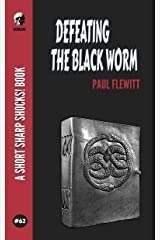
How will you cope with bad reviews on this book?
I’m very philosophical about bad reviews. You can’t please everyone all the time. If the reviewer has a good point and is constructive then I’ll take it on board. If they just didn’t like the story, then I can’t help that. In that case, I’ll just shrug and move on.
What’s the one thing you would give up to become a better writer?
Time. It seems an obvious remark, but the only thing you can do to be a better writer is to keep at it, keep developing and keep writing. I take on board comments from my editor, and I take constructive critique on board. Its a process that never ends, and there are no short cuts. So, I’ll give my time.
Thank you for joining me in the tearoom, Paul. Let us wish you lots of wonderful sales with your book.
To find out more about Paul’s work click on the links below:
Facebook: PaulFlewittAuthorofDarkFiction
Twitter: @RealPaulFlewitt
Instagram: PaulFlewittAuthorofDarkFiction
Wattpad: @DarkFantastique
Amazon Paul Flewitt’s author page:
If you want to find out more about Clubhouse Members’ Books, don’t forget to check out the Clubhouse Bookshops, too.
January 6, 2021
Granny Wenlock knows, you know
Granny Wenlock is getting impatient for her next adventure. Let me introduce you to her in a quick read.
So if you’re looking for something on the dark side of life to bring a smile to your face. Then Granny is the person to do that as she keeps her descendant, Dave Cavendish on his toes. Dave is ready to close his detective agency for good when Ms. Sinclair swans in. Granny knows she’s nothing, but trouble and isn’t about to allow a little thing, like her death 420 years ago to stop her from warning Dave to be vigilant.
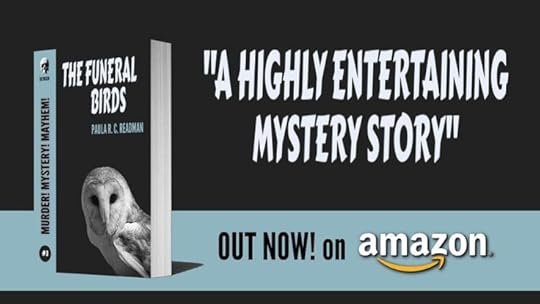
The Funeral Birds has everything Murder, Mystery and Mayhem also includes a witch and nesting owls in a ruined church.
https://mybook.to/thefuneralbirds
January 5, 2021
Clubhouse Guest’s Chat: Myles Stafford
Welcome to Clubhouse Chat page. Those of you who are not a member won’t be aware that the location of the Clubhouse is shrouded in mystery. The only way to visit it is via membership or an invite to the tearoom. Every few days, I’ll be sharing a conversation with all sorts of writers and authors at different levels of their writing careers. Over tea and cakes, or maybe a glass of something stronger, I shall be chatting with my guest about their work in progress, or latest book release.

Today I’m talking to dystopian writer, Myles Stafford. Welcome to the tearoom, Myles and tell us about your writing.
Thank you for your invite, Paula. As far as strong writing points for me, that’s easy. I write in the first person. I find it to be a difficult way to write, since the character who is speaking can only speak of their knowledge in the moment, or look back and speak about what they learned later. When an author writes in the third person, they can write with full knowledge of everyone and everything. Still, I prefer the first person medium since it gives the reader a greater sense of who the protagonist really is, her thoughts, fears, hopes, dreams, and so on. I learned this technique as a boy from Edgar Rice Burroughs, the author of the “John Carter of Mars” and “Tarzan” series. I’m not aware of anything that Mr. Burroughs wrote that was not in the first person.
 Myles Stafford
Myles Stafford
On the topic of personal influences for my writing, in addition to Edgar Rice Burroughs, I would add J.R.R. Tolkien. I’ve written a pilot script for the series, and have submitted it for consideration, so I would have to add that I am influenced by and prefer gritty, realistic visual work, such as that produced by Jerry Bruckheimer, James Cameron, and the people who put together “The Walking Dead” series. I would add, too, that I feel a visual adaptation of these books must be realistic, visually impactful, fast paced, and include a musical score that stands out as exceptional on its own, such that it becomes a recognizable part of the story.
Needless to say, I’m very proud of “The Killer Angel” series. To me, the protagonist, Nicki Redstone, is an amazing person, and someone whom we can love and believe in – a real hero who we could use today.
I do have a couple of unfinished projects, of course. I built the framework for a self-help book for middle managers, which is where I spent most of my career working for large outfits, whether corporate America or the military. Maybe I will finish it one day. I also have chapters of “The Killer Angel, Book Five” complete or partially complete. Will I ever finish it? I just don’t know. I have other things that would be easier to write, but I am on hiatus from writing, at least for a while.
You asked about the discipline of writing, research, hours and so on. Although my work so far is mostly fictional, I like to make certain that all aspects are technically accurate, so I will do as much research as necessary to be carefully accurate. I believe this is essential to good writing. Beyond that, I am an undisciplined writer. My view is that good writing is a creative process, not something that comfortably lends itself to a word count. I don’t follow that logic for producing something wonderful. I suppose that assigning oneself to a set number of hours for writing would work, but I tend to write when I have creative thought, then it just explodes on pages, and I can’t get it all down fast enough. When that happens, it just flows, sometimes late into the night. I write what I like to read, and always seek to avoid the typical, boring formulas that are so rampant in books, television and movies today. To write using a formula that “works” means that the story is there for commercial success, versus being something creative, fresh and thought-provoking.
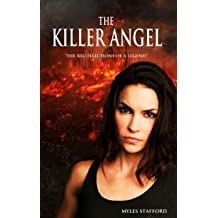
To me, enjoyable, entertaining fiction requires two important ingredients (at least!) – One: A goodstoryteller. Two: A reader who can believe. I think that my books contain a story about a very real person who survives in a dystopian, apocalyptic future. If you can believe in her, then you will be engulfed and entertained by her story. And if you are, I’m happy.
Thank you again, Paula, for your kindness in inviting me to the Clubhouse Tearoom Chat. It’s been a genuine pleasure.
Thank you for joining me, Myles in the tearoom. If you would like to find out more about about Myles’ writing and books check out the links below:
Twitter: https://twitter.com/MylesAStafford
Amazon: https://www.amazon.com/Myles-Stafford/e/B011VO346K
If you want to find out more about Clubhouse Members’ Books, don’t forget to check out the Clubhouse Bookshops, too.
January 4, 2021
Clubhouse Guest’s Chat: Richard Meldrum
Welcome to Clubhouse Chat page. Those of you who are not a member won’t be aware that the location of the Clubhouse is shrouded in mystery. The only way to visit it is via membership or an invite to the tearoom. Every few days, I’ll be sharing a conversation with all sorts of writers and authors at different levels of their writing careers. Over tea and cakes, or maybe a glass of something stronger, I shall be chatting with my guest about their work in progress, or latest book release.

Today, I’m chatting to horror writer, Richard Meldrum. Welcome to the tearoom, Richard.
Thank you for the invite, Paula.
Now we have our refreshments let’s start by asking you when you first begun your writing journey what drew you to your chosen genre?
I’ve always dabbled in writing. My first serious attempt to write stories was way back in the 1990s, but after a number of rejections and no acceptances I stopped, only starting again in 2014 when I rediscovered my old stories on a hard disk and was surprised how good they actually were. That started me writing again. A self-published collection in 2015 was swiftly followed by submissions to a number of small presses and magazines. While I’m still getting rejections, I’m also getting routinely accepted too – to date, I’ve had about 175 short stories, drabbles and novelettes published, with more coming in 2021 and beyond
Which writing elements do you think is your strongest points, and what would you like to do better?
Hard question to answer, but I’ll do my best! Let’s start with my weak points – I don’t use a huge range of character names – aside from my recurring characters, I use the same range for different characters, which I need to improve on. I also tend not to overly describe my characters, but that is partially deliberate, since I prefer readers to use their imagination, but, as the author, I could probably do with giving readers my vision of what I think the characters look like. I also don’t write much gore or horror, which might not actually be a weakness for some readers. In terms of strengths, I think I write dialogue well. I also feel that my stories and characters behave logically and that I don’t make them do anything that isn’t sensible or logical in order to simply progress the story (I’ve always been perplexed by movies and books when the character goes into that dark basement to investigate a noise or opens the front door to a creepy stranger on a dark and stormy night).
 Richard Meldrum
Richard Meldrum
Tell us a little about latest writing project. Is it a new idea, or one you have been mulling over for some time?
I’ve just finished a 10,000 word novelette which has been accepted and will be published in 2021. I had the idea a while ago, but it actually didn’t take long to write. I can’t give too many details, but the theme is eco-horror, an area that I’m writing more and more of. I’m also working on some Gothic style stories, again one of my favourite genres (to both read and write).
How many unfinished projects do you have on your computer?
I’ve got a couple of longer short stories that I want to finish, plus a pile of completed work that I’m hoping to submit over the next few months. I’ve usually got something on the go, whether it be a drabble that I can write in minutes or a longer piece that might take weeks.
Do you write a synopsis first, or plan your short story or do you let the characters lead you?
I only really write short stories (although I have dabbled in novelettes and novellas). Sometimes I can ‘see’ the entire story, but in other instances I start with a single concept or image. Sometimes I’m not even sure how the story will end. One of my ‘rules’ is that my characters must act logically, and I try to avoid story lines or events that are illogical or downright incorrect – one of my pet peeves is watching a movie or reading a book when a character does something completely illogical just so the story can advance or if something happens that wouldn’t be possible or logical in real life

Choosing only five of your favourite authors. Can you list them in order 1 begin the top of your list and say how have they influenced your writing?
Robert Aikman, M.R. James, Edith Wharton, August Derleth and Basil Copper. I love all these writers and try to emulate their styles (with my own twists of course.)
What did you learn when writing your book or story? In writing it, how much research did you do?
I don’t always do research, sometimes it’s not required. Instances when I have done research include investigating the history of the Rolls-Royce company to ensure I nailed the right model and year (for a story set in Edwardian times) and asking a couple of limnologists about lake ecology. As I said in the previous response, there are parts of a story that must be correct, whether that be historical details or scientific information and mistakes in these ‘unchangeable’ facts can ruin a story. An example of a pitfall I avoided was my story in the Feral anthology from West mesa Press, published in 2020. My story involved children being adopted by a bear, but it was set in England in a time period when there were no wild bears in the U.K. I didn’t want to change the story, so I had to add a part revealing the bear had escaped from a travelling circus. Disaster avoided!
Is there anything about you your readers might be surprised to find out?
My wife and I live on a hobby farm in Ontario, Canada and when I’m not writing and working, we’re looking after that. We have some rescue pigs and a kennel of sled dogs. In the winter, we’re usually out training the dogs for various events and races. I usually run a 4 or 6 dog team and we participate in the famous Sequin Mail Run, where specially designed ‘sledvelopes’ are carried by dog team.
What is your work schedule like when you’re writing?
I typically write in the morning, but I have no set pattern. I write when I have the urge or a deadline. If I don’t write, I try to edit. I always like to have something on the go.
How do you select the names of your characters? Do you know everything about them before you start writing their story?
I tend to use fairly ordinary (boring?) names for my characters. Occasionally, I use a name of someone I know (especially when they have said something to inspire the story). I do have a reasonable idea of who they are before I start writing – whether they are good, bad or just indifferent in terms of their characters and how they will interact with each other. I also rarely physically describe my characters; I prefer my readers to put flesh on the bones.
Thank you for joining me in the tearoom, Richard.
To find out more about Richard’s books and writing, please check out the link below:
Blog: http://wolfstarpublishing.com/meldrum/
If you want to find out more about Clubhouse Members’ Books, don’t forget to check out the Clubhouse Bookshops, too.
January 3, 2021
Clubhouse Guest’s Chat: Elizabeth Ducie
Welcome to Clubhouse Chat page. Those of you who are not a member won’t be aware that the location of the Clubhouse is shrouded in mystery. The only way to visit it is via membership or an invite to the tearoom. Every few days, I’ll be sharing a conversation with all sorts of writers and authors at different levels of their writing careers. Over tea and cakes, or maybe a glass of something stronger, I shall be chatting with my guest about their work in progress, or latest book release.
 Photo by Valeria Boltneva on Pexels.com
Photo by Valeria Boltneva on Pexels.comToday I’m welcoming time slip and cozy crime author Elizabeth Ducie to the tearoom. Thank you so much for joining me, Elizabeth. I hope you drink is to your liking.
Thank you for your invite to this wonderful tearoom, Paula. The champagne is lovely, thank you.
Now we have our refreshments, please can I start by asking you when you first begun your writing journey and what drew you to your chosen genre?
I had been a technical writer for many years when I decided to let my creative side out to play, back in 2006. During a thirty year career in international pharmaceutical manufacturing, I had worked in more than fifty countries; seen huge political change; and had a whole host of anecdotes I wanted to write about. So I thought my chosen genre was creative non-fiction or life writing. But I found to my surprise that I was happier, and better, putting real incidents into fictional settings. But what did survive was my intention to write about places more than anything else. With all four of my novels and with many of my short stories, I have started with a location, then peopled it, then gave them a story to tell.
How many unfinished projects do you have on your computer?
In terms of novels, there’s only the one on the computer, although there are several more buzzing around in my head. But I have over 200 short stories, flash fiction, and other pieces of writing on file that I would like to find a home for at some point. I never throw any words away—ever!
Tell us a little about latest writing project. Is it a new idea, or one you have been mulling over for some time?
This really follows on from the previous answer. I’ve always been a bit of a grasshopper, jumping from place to place, writing-wise. There are actually four projects in the pipeline for 2021. After four novels set in far away places, I have now decided to bring my writing ‘home’ and am working on a cosy murder mystery set in a fictional village just a couple of miles up the road from where I live. Think Midsomer Murders in South Devon. It’s been through beta reader stage and should have been published for this Christmas, but I had major surgery in August which threw my whole schedule out of kilter. I now hope to finish it for the spring.
But for years, I’ve been toying with returning to my original idea and having another go at life writing. I have collected loads of notes from holidays and other trips with members of my family; and would like to put together a series of short, humorous travel books. Similarly, all those short stories and pieces of flash fiction I mentioned previously are completely wasted sitting in a file somewhere; so I’m considering putting out a series of short fiction books as well.
As an indie publisher with a decade of experience, the production process is pretty slick now, so although I know I won’t get everything done, I’ve got a fair shot at increasing my published portfolio considerably this year.
And finally, after eight years away from the world of pharma, I am about to sign a contract to co-author the second edition of a text book originally published in 2002. That will take me temporarily out of indie publishing and back into the traditional route, which is going to be an interesting experience.
 Elizabeth Ducie
Elizabeth Ducie
Do you write a synopsis first or write the first chapter?
When I was studying for my MA in Creative Writing (as a very mature student in 2010/1) I took a module of writing screen treatments. And although I’ve never written any plays or screenplays, the technique is very useful for novels as well. It involves describing each individual scene in a short paragraph, working on the principal of what will be seen. So no thoughts or feelings; just actions. It’s great for developing the ‘show, don’t tell’ aspects of the story; but also ensures that every scene moves the story on in some way. I usually start with the first draft of the treatment, and then refine it as I go along. It helps me record other aspects like POV and timescale all in one place.
Were any of your characters inspired by real people?
Several of them, yes. Gorgito, the eponymous hero of my debut novel, is based on someone I used to work for in Russia. His goal was to build an ice rink in an area where facilities were poor and skaters could only practise in the winter. Unfortunately, he died before he could achieve it; so I thought I would build it for him – at least on paper.
In Counterfeit, the conversation with the health minister about whether or not he could afford the luxury of concern over quality of the drugs was based on a true conversation I had with a real politician. And the struggle by local authorities to beat the criminal gangs was based on the campaign by the very courageous head of the Nigerian FDA in the 1980s and 1990s, Dora Akunyili. She risked everything after her sister died through taking fake insulin; I wanted to pay tribute to her.
What did you learn when writing your book? In writing it, how much research did you do?
Each of my novels has involved an element of time slip. The contemporary threads were relatively straight-forward, as I had visited and worked in all the countries involved. But the historical threads were different and require a lot of research. In Gorgito’s Ice Rink, the back story covered Russia from 1949 to 1970. I did a lot of background reading to begin with. Then I discovered Just Send Me Word by Orlando Figes, the history of Lev and Svetlana, an old couple in Moscow, based on the 1200+ letters they wrote during the time he was in the Pechora Labour Camp in the 1940s and 1950s. It not only gave me a huge amount of background information about Stalin’s Russia, but also suggested a major plot twist that shaped the rest of the book.
In Deception!, the antagonist’s back story takes place in southern Africa in the 1960s and 1970s. I had finished the first draft and was doing some additional research when I realised one of the countries I had used was in the middle of a civil war at the time—and I had neglected to even mention it! While it wasn’t a major part of the story, I couldn’t afford to just wipe it out of history altogether.
What is your work schedule like when you’re writing?
As I said earlier, I’m a bit of a grasshopper. My work schedule tends to be quite variable. But I try to regulate my writing as much as possible, so I don’t find other things to do instead. For novels and creative non-fiction books, the first draft is written during November (I have completed NaNoWriMo for the past eight years.) so I write around 2K words per day, always first thing in the morning. With a background in production management, I work best under pressure and have always been an advocate of the Just In Time principle.

Did you ever consider writing under a pseudonym?
Elizabeth Ducie is a pseudonym made up of my middle name and my maiden name. When I started writing creatively, I was still working in pharmaceuticals and my technical books were published under my married name (Kate McCormick). I didn’t want there to be any confusion; and I also wanted the freedom to write and publish things without having to worry about what my bosses thought about them. It can be confusing at times; all my social media accounts are in my pseudonym, but people who know me well call me Kate in the discussions. And when I am emailing people, I can never remember which persona I am supposed to be inhabiting at the time. Not sure I would go down the same route if I had my time over again.
How do you select the names of your characters? & do you know everything about them before you start writing their story?
Since many of my characters come from other countries and other cultures, I research to make sure they are authentic. But I try to keep them simple. Years ago, my aunt told me she was put off reading my works by the difficulty of pronouncing the characters’ names in her head when she read them. And I try to avoid duplication of initial letters as much as possible. I have noticed recently that when I am writing British or American characters, I have a habit of using names with ie or y on the end: Charlie, Annie, Suzy etc. That can get irritating and as I am starting to write more ‘home-based’ pieces, that’s a habit I need to break.
I have a huge template for discovery which I complete for all the main characters when I start writing the book. It runs to about 6 pages and covers background, likes and dislikes, character strengths and weaknesses etc. I’m not sure I always get all the details right in the final book, but it helps me get to know them well. And it helps with consistency when I am writing a series.
How long on average does it take you to write a book?
The first novel took me about seven years, as I was learning my trade and also trying to decide whether to go down the indie route or not. But these days, I tend to work on an annual cycle: first draft during November; editing and formatting January to August; launch and promotion September and October.
Thank you for joining me in the tearoom, Elizabeth. To find out more about her writing and books check out the links below.
Blog: http://elizabethducieauthor.co.uk/category/my-blog/
Elizabeth’s books: http://elizabethducieauthor.co.uk/my-books/
If you want to find out more about Clubhouse Members’ Books, don’t forget to check out the Clubhouse Bookshops, too.
Clubhouse Guest’s Chat: R. J. Ellory
Welcome to Clubhouse Chat page. Those of you who are not a member won’t be aware that the location of the Clubhouse is shrouded in mystery. The only way to visit it is via membership or an invite to the tearoom. Every few days, I’ll be sharing a conversation with all sorts of writers and authors at different levels of their writing careers. Over tea and cakes, or maybe a glass of something stronger, I shall be chatting with my guest about their work in progress, or latest book release.

Today in the tearoom I’m chatting to the English thriller writer R. J.Ellory. Welcome to the tearoom, Roger, and to a positive New Year. Hopefully 2021 will be much kinder to us all. I do hope I have chosen the right drink for you.
Thank you for your invite, Paula.
You’re very welcome. May I start by asking you, when you first began your writing journey what drew you to your chosen genre?
Well, for me, the thing I am interested in is people. That’s the sum total of my interest. People. The situations they get themselves into. How they deal with them. How they react. The decisions they make as a result. That’s what fascinates me and that’s what I want to write about. The truth about the crime genre is that it can encompass so very much as far as subject matter is concerned. A crime thriller can be historical, it can be political, it can be a straight homicide investigation, it can be a conspiracy. It gives you an enormous canvas, you see. We all know that the way criminal investigations are portrayed on TV is about as far from the reality as you could imagine. I spent some time with a homicide detective in Washington, and she told me that she would sometimes be working four or five or six homicides simultaneously. Aside from the fact that such a schedule prohibits any kind of personal life, it also means that the amount of attention that can actually be devoted to one case is very limited. Homicide investigation is a tough, unforgiving, unrewarding, brutally dark and relentless vocation, and there are very few people capable of doing it. I think that crime fiction reflects that more honestly than any crime series on TV. And the thing that never ceases to amaze me is the indomitability of the human spirit, the things that people are capable of overcoming, and the fact that they can then survive beyond that. For me, writing ‘crime thrillers’ or ‘mysteries’ is not so much about the crime itself, even the investigation, but the way in which such events can be used to highlight and illuminate the way that people deal with things that are not usual. If there is one common thread throughout my books, though they are all very different stories, it is that we are always dealing with an ordinary person thrown into an extraordinary situation. That’s the common theme. That’s the thing that fascinates me. I suppose I am a romantic at heart, and I try very hard to be in touch with the emotional nature of people and things, and what I am always striving to do is have a reader feel what the characters are feeling, to get an idea that they have spent some time with real people, and to bring about the sense that they were aware of what was going on with that character on many levels. That, for me, seems key to making a book memorable. And presenting characters with difficult situations that people ordinarily don’t have to deal with gives you the whole spectrum of human emotions and reactions to write about. So, in truth, I would say that the genre in which I write is more ‘human drama’ than crime. The crime creates a scenario, and how people the deal with that scenario is the focus for me.
Which writing elements do you think are your strongest points, and what would you like to do better?
Perhaps the emotional engagement of the characters. For me, as I have said so many times, a good story is all about emotion. The first thing I decide when I embark upon a new book is ‘What emotions do I want to create in the reader?’ or ‘When someone has finished this book and they think about it some weeks later, what do I want them to remember…what emotion do I want them to feel when they recall reading the book?’ That’s key for me. Those are the books that stay with me, and those are the books I am constantly trying to write. There are a million books that are brilliantly written, but mechanically so. They are very clever, there are great plot twists and a brilliant denouement, but if the reader is asked three weeks after reading the book what they thought of it they might have difficulty remembering it. Why? Because it was all very objective. There was no subjective involvement. The characters weren’t very real, they didn’t experience real situations, or they didn’t react to them the way ordinary people react. It was more of a mental exercise, a puzzle-solving exercise, than a real emotional rollercoaster. In fact, some of the greatest books ever published, the ones that are now rightfully regarded as classics, are those books that have a very simple storyline, but a very rich and powerful emotional pull. It’s the emotion that makes them memorable, and it’s the emotion that makes them special. Character is everything for me, so a book should be filled with the blood of the character, at least figuratively speaking! In writing a book it changes along the way, as all my books do, and they change because the characters become that much more real, and thus they actually begin to inform and influence the direction of the story. I don’t want that to sound pretentious, you know, but I am always working against an emotional barometer. If I don’t feel it, then the reader won’t. Personally, I have a major issue with central characters who are always right, who leap to the wildest conclusions about things, and are then proven right. People are not like that at all. They make mistakes constantly, and investigators and police are the same.
What would I like to do better? That’s a tough one! If I knew that, then I would always be working to do it better and would probably be better at it! I also have to take into consideration the fact that what I think I do well and what someone else thinks I do well could be very different things. I like to explore characters. I like to really get under their skin. I have had editors who have said that this kind of thing needs to be trimmed back in order to increase the pace of the story. I think it’s too subjective a question to really answer with any great clarity, to be honest!
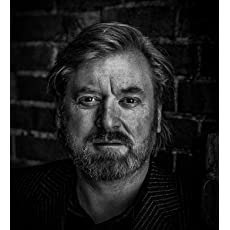 R.J. Ellory
R.J. Ellory
Tell us a little about latest writing project. Is it a new idea, or one you have been mulling over for some time?
During the past nine months, I have completed the book that is being released in February 2021 (‘Proof of Life’), also the book for 2022 (untitled as yet, but set in the very north-east of Canada). I have also written two feature films and a six-part TV adaptation of one of my books (‘The Man Who Ate The World’). While I have been under ‘house arrest’ I have taken advantage of the time available and really focused on getting as much done as possible. I have also written all the material for a new album with my band, and we are currently working out how to get that recorded. I am fortunate enough to be in a situation when my income as a writer allows me to be a writer. These days, that is more and more rare. It is a tremendously fickle and unreliable way to live your life, but that is what I have chosen to do, and I will continue to live that way as long as I can. My brother keeps asking me what I’m going to do when I grow up, but I don’t believe I ever will. So, to answer the question, there have been numerous ‘latest writing projects’, but aside from the final editorial work needed on the book for 2022 they are all completed. I will now embark on the book for 2023.
How many unfinished projects do you have on your computer?
In truth, none. I finish what I start. I dedicate myself to getting it finished as rapidly as I can so I can move on to new projects. I factually don’t have the time to spend a long time writing a book, if you know what I mean!
Do you write a synopsis first, write the first chapter, or do you let the characters lead you?
I do not write an outline or a synopsis. I just simply have a rough idea of the kind of story I would like to write. I have a definite idea of the time period and location as these are vital to the tone of the novel. And the last thing, and the thing I have the clearest idea of, is how I want the reader to feel. I change my mind as I work. I make new decisions about characters, about the ending, about all sorts of things. I just keep trying to write the best novel I can. I think the worst kind of novel you could write is the one that you think other people will enjoy, and the best novel you could write is the one that you believe you yourself would enjoy. With me, the most important thing about any novel is the emotion it evokes. The reason for writing about the subjects I do is simply that such subjects give me the greatest opportunity to write about real people and how they deal with real situations. There is nothing in life more interesting than people, and one of the most interesting aspects of people is their ability to overcome difficulty and survive. As I said, I think I write ‘human dramas’, and in those dramas I feel I have sufficient canvas to paint the whole spectrum of human emotions, and this is what captures my attention. I once heard that non-fiction possesses, as its primary purpose, the conveying of information, whereas fiction possessed the primary purpose of evoking an emotion in the reader. I love writers that make me feel something – an emotion, whatever it might be – but I want to feel something as I read the book. Once again, there are millions of great books out there, all of them written very well, but they are mechanical in their plotting and style. That is not meant as a criticism, because that degree of clever plotting takes a great intellect, and is probably something I just could not do well. However, the books that really get me are the ones I remember months later. I might not recall the names of the characters or the intricacies of the plot, but I remember how it made me feel. For me, that’s all important. The emotional connection. Those are the kind of books I am trying to write, and those are the books I read.
What is your work schedule like when you’re writing?
I am disciplined. I start early in the day. I try and produce three or four thousand words a day, and work on the basis of getting a first draft done in about ten or twelve weeks. Sometimes it takes longer, sometimes shorter. I buy a new notebook, a good quality one, because I know I’m going to be carrying it around for two or three months, and in the notebook I will write down ideas I have as I go. Little bits of dialogue, things like that. Sometimes I have a title, sometimes not. I used to feel very strongly about having a good title before I started, but now – because at least half the books I’ve published have ended up with a different title – I am not so obsessive about it! And as far as little idiosyncratic routines and superstitions are concerned, I don’t know that I actually have any that relate to starting a book.

Do you set yourself a daily word count?
Yes, as above. I aim for a minimum of two and a half thousand words a day. I have written as much as eleven thousand words in a day, but that’s rare. For me, it’s more about really feeling as though I have accomplished a substantial amount of work in any given day, but also having created work of good quality. I want to feel as though it has been a day well spent, but also that I have progressed the novel enough to know where I am taking the narrative when I sit down to work tomorrow.
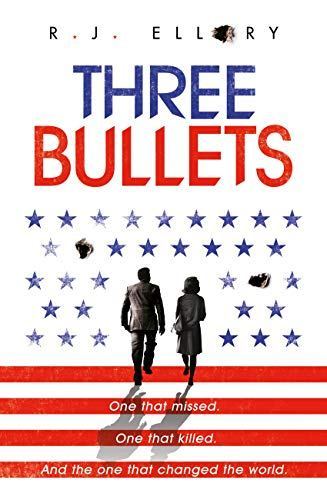
How many hours a day do you write?
On average, I would say about five or six. It really depends on the day, what else I need to do, and what is being demanded from me by the various people with whom I am engaged in different and varied projects. One thing I will say is that I am very organised. I know what needs to be done, and I am not work-shy!
What was your hardest scene to write?
I am constantly challenging myself to write scenes that I find difficult. Because I don’t have a synopsis, I can often choose the direction in which to take the story and the characters, and I routinely choose the direction that I feel will be the most difficult to write. I feel that I have a duty to constantly expect more of myself, and that I must force myself to be bolder and courageous in my subject and plot choices. I feel that any creative faculty is a muscle, and that you need to exercise it continually. I don’t ever want to feel as though I am taking the easy option, or that I am writing to a predetermined pattern or formula. Hence, the latest two books are set in entirely different locations, and are both very different from anything I have done before.

How long, on average, does it take you to write a book ?
I work on the basis of getting the first draft done in ten or twelve weeks, and then a couple more weeks to fix the things that need fixing and fulfilling any editorial requirements. Because I write without a synopsis, I never know the end of the book until I have written it, so part of the process is to go back through the script and fix anything that now doesn’t make sense, considering that the end is now established.
Thank you for taking time out from your busy schedule, Roger, to join me in the tearoom.
If you would like to find out more about R.J. Ellory’s writing and books, please check out the links below.
Blog: R.J.Ellory
Goodreads: R.J.Ellory
If you want to find out more about Clubhouse Members’ Books, don’t forget to check out the Clubhouse Bookshops too.
January 2, 2021
Oh, those little rays of happiness….
What a great start to this new year. After years of writing, editing and rewriting a review from an unknown reader brings a smile to my lips and brightens my day.
I wish I could thank the reviewer and let them know how much this means to me. All my reviewers have no idea how much I struggled at school. How frustrated I used to get, and sometimes still do when I can’t put into words what I want to say.
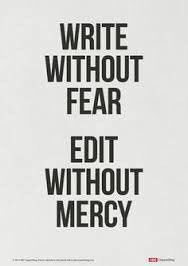
Self-doubt is huge and eats you up when rejection after rejection comes back. Stone Angels had 37 rejections though some of the publishers were kind enough to give feedback and encouragement to edit it further. I must say I did improve my editing skills over the eight months it took me to reduce the word count by tightening Stone Angels up by writing more concise sentences.

What I’m trying to say is don’t give in to self-doubt but listen to what others are saying. Writing is all about rewriting and editing to make your words sing in tune for your readers to forget the world around them and lose themselves in your story.
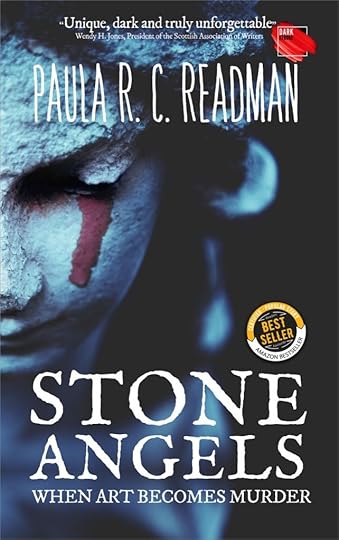 Stone Angels is available as an ebook or paperback
Stone Angels is available as an ebook or paperback
January 1, 2021
Clubhouse Guest’s Chat: J.P. Reedman
Welcome to Clubhouse Chat page. Those of you who are not a member won’t be aware that the location of the Clubhouse is shrouded in mystery. The only way to visit it is via membership or an invite to the tearoom. Every few days, I’ll be sharing a conversation with all sorts of writers and authors at different levels of their writing careers. Over tea and cakes, or maybe a glass of something stronger, I shall be chatting with my guest about their work in progress, or latest book release.
 Photo by Adrianna Calvo on Pexels.com
Photo by Adrianna Calvo on Pexels.comToday in the tearoom I’m chatting to historical writer, J.P. Reedman. Welcome Janet.
Thanks for the invite to your lovely tearoom, Paula.
Now we have our refreshments, let’s start by asking you when you first begun your writing journey what drew you to your chosen genre?
I have always had a deep, abiding love of the past. One of my first stories was about Cleopatra–I was five.
What writing elements do you think are your strongest points, and what would you like to do better?
I am very strong on visual imagery. If I describe a castle that actually existed but is ruins now, I want my reader to see that castle as it was through a picture painted with words. My weakest point used to be dialogue but I have improved with practice and got away from too much ‘ye olde English’ type conversations.
Tell us a little about latest writing project. Is it a new idea, or one you have been mulling over for some time?
My current one is about a very wicked medieval lady called Mabel; legend calls her the ‘mother of the Devil’! I have another project planned for 2020 which involves the rewrite of an epic fantasy I wrote in the early 80’s. I threw away the original draft as it was impossible to work with–but I cannot get the characters and landscapes out of my head. It still begs to be written!
 J.P. Reedman
J.P. Reedman
Choosing only five of your favourite authors. Can you list them in order 1 begin the top of your list and say how have they influenced your writing?
A mixture of fantasy and historical fiction writers–Tolkien (epic, mythology, worldbuilding), Alan Garner (folklore and sense of place), Susan Cooper (same as Garner), Rosemary Sutcliff (historical fiction deeply associated with place and memory), Sharon Kay Penman (looking at historical characters in new ways.)
Were any of your characters inspired by real people?
In my historical fiction, all my books are based on actual figures and most are written in first person from the MC’s viewpoint. I never thought I would write in either 1st person or about real people, but things turned out very differently, and I now enjoy writing both!
Is there anything about you your readers might be surprised to find out?
I grew up in Canada, moved to the UK in 1992, was in an episode of a TV series with Johnny Depp, and worked twelve years at Stonehenge!

Do you set yourself a daily word count?
I don’t set myself a target but I make sure I write at least *something* every day.
How many hours in a day do you write?
Two or three. Other time is filled by Twittering and other book promo.
Did you ever consider writing under a pseudonym?
My first name is Janet. Some of my early poems and stories from the 1980’s are still floating around the Internet under the name Janet P. Reedman. I went to ‘J.P.’ because I was afraid men wouldn’t buy my novels about the Wars of the Roses, imagining that they were festooned with romantic scenes or something! In fact, I write better battles than bedroom scenes!
How long on average does it take you to write a book?
I endeavour to get out three books a year, with maybe a couple of short stories or novellas in between, so roughly about 4 months, though in reality anything between 3-7.
Thank you for joining me, Janet, our driver, Brutus will run you home when you’re ready to leave.
If you want to find out more about J.P. Reedman’s writing and books check out the links below:
LONGSWORD’S LADY: http://mybook.to/elasalisburyMedieval Babes series (Little-Known Medieval Women) http://mybook.to/medievalbabesWars of the Roses: I RICHARD PLANTAGENET SERIES: http://mybook.to/Richardseries
Facebook page: https://www.facebook.com/IRichardPlantagenet
If you want to find out more about Clubhouse Member’s Books don’t forget to check out the Clubhouse Bookshops too.
December 31, 2020
Clubhouse Guest’s Chat: Chris Wood
Welcome to Clubhouse Chat page. Those of you who are not a member won’t be aware that the location of the Clubhouse is shrouded in mystery. The only way to visit it is via membership or an invite to the tearoom. Every few days, I’ll be sharing a conversation with all sort of writers and authors at different levels of their writing careers. Over tea and cakes, or maybe a glass of something stronger, I shall be chatting with my guest about their work in progress, or latest book release.
 Photo by Pixabay on Pexels.com
Photo by Pixabay on Pexels.comToday I’m chatting to crime writer Chris Wood. Welcome to the tearoom, Chris. My first question to you is what would you like to drink?
Thank you for invite me, Paula. Please could I have a double espresso, thank you.
Right, now we have our drinks can I start by asking you when you first begun your writing journey what drew you to your chosen genre?
I was a Detective in the police for many years, so I guess the crime genre was a given for me. The years of experience provided insights into humanity and life at the extremes. I often wondered ‘What if?’ Which is a great starting place for a novel.
What writing elements do you think is your strongest points, and what would you like to do better?
I hope my writing portrays a true, gritty, realistic representation. I would like to develop my writing in the area of intriguing, interpersonal relationships between the characters.
How many unfinished projects do you have on your computer?
My initiation to writing has been quite methodical. ‘County Lines’ was my first project, which thankfully came to fruition. I’m currently 30,000 words into the sequel; ‘Crossed Lines.’ So maybe some unfinished projects will start to accumulate when I approach my third, stand-alone, novel!
Do you write a synopsis first or write the first chapter or let the characters lead you?
I write the first chapter first, I love the creativity of starting with the bones of a story and developing it along the way.
When reading your work through do you ever find that your daily mood swings are reflected in your writing?
Yes definitely. It’s fun observing them whilst edit reading. Characters tend to be more sarcastic, ruthless and nasty when I’ve had a bad day!
Were any of your characters inspired by real people?
My characters tend to be an amalgam of several people, especially the detectives, it’s great fun piecing together quirks and eccentricities!
 C.J. Wood
C.J. Wood
What is your work schedule like when you’re writing?
There are never enough hours in the day when the story is flowing from the pen!
Do you set yourself a daily word count?
I try to set a word count of 1000 words a day, rather than a target of hours. I love the feeling of achievement when I surpass the target. If a few non-productive days go by, I do get a bit itchy to get going again.
What was your hardest scene to write?
A scene where two gangsters are confronted by a ‘would be’ assassin. The gangsters fight fire with fire and a battle to the death follows. I endeavoured to maintain a fast-paced scene whilst balancing it with the inclusion of sufficient detail.
How long on average does it take you to write a book?
‘County Lines’ took six months to write, I am impatient by nature, so I need to keep a check on it and maybe slow down a little.
Thank you, Chris for joining me in the tearoom.
If you would like to more about Chris Wood’s writing and books check the links out below.
Goodreads: https://www.goodreads.com/author/show/20488419.CJ_Wood
If you want to find out more about Clubhouse Member’s Books don’t forget to check out the Clubhouse Bookshops too.

